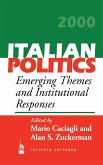- Broschiertes Buch
- Merkliste
- Auf die Merkliste
- Bewerten Bewerten
- Teilen
- Produkt teilen
- Produkterinnerung
- Produkterinnerung
Institutional Capital documents and explores the new forms of relationships developing between local governments and organized elements of civil society in post-Communist Poland.
Andere Kunden interessierten sich auch für
![Social Capital and Institutional Constraints Social Capital and Institutional Constraints]() Joonmo SonSocial Capital and Institutional Constraints209,99 €
Joonmo SonSocial Capital and Institutional Constraints209,99 €![Institutional Foundations of Federated Defense Institutional Foundations of Federated Defense]() Stephanie Sanok KostroInstitutional Foundations of Federated Defense52,99 €
Stephanie Sanok KostroInstitutional Foundations of Federated Defense52,99 €![The Institutional Origins of Communal Violence The Institutional Origins of Communal Violence]() Yuhki TajimaThe Institutional Origins of Communal Violence81,99 €
Yuhki TajimaThe Institutional Origins of Communal Violence81,99 €![EU institutional structure: EU institutional structure:]() Marina DanilinaEU institutional structure:34,99 €
Marina DanilinaEU institutional structure:34,99 €![Emerging Themes and Institutional Responses Emerging Themes and Institutional Responses]() Emerging Themes and Institutional Responses151,99 €
Emerging Themes and Institutional Responses151,99 €![GOVERNMENT INSTITUTIONAL PERFORMANCE AND SOCIAL CAPITAL IN GHANA GOVERNMENT INSTITUTIONAL PERFORMANCE AND SOCIAL CAPITAL IN GHANA]() David WandGOVERNMENT INSTITUTIONAL PERFORMANCE AND SOCIAL CAPITAL IN GHANA53,99 €
David WandGOVERNMENT INSTITUTIONAL PERFORMANCE AND SOCIAL CAPITAL IN GHANA53,99 €![Micro-institutional Foundations of Capitalism Micro-institutional Foundations of Capitalism]() Roselyn HsuehMicro-institutional Foundations of Capitalism87,99 €
Roselyn HsuehMicro-institutional Foundations of Capitalism87,99 €-
-
-
Institutional Capital documents and explores the new forms of relationships developing between local governments and organized elements of civil society in post-Communist Poland.
Hinweis: Dieser Artikel kann nur an eine deutsche Lieferadresse ausgeliefert werden.
Hinweis: Dieser Artikel kann nur an eine deutsche Lieferadresse ausgeliefert werden.
Produktdetails
- Produktdetails
- Verlag: Globe Pequot Publishing Group Inc/Bloomsbury
- Seitenzahl: 270
- Erscheinungstermin: 11. Januar 2005
- Englisch
- Abmessung: 216mm x 140mm x 16mm
- Gewicht: 385g
- ISBN-13: 9780761829560
- ISBN-10: 0761829563
- Artikelnr.: 30886663
- Herstellerkennzeichnung
- Libri GmbH
- Europaallee 1
- 36244 Bad Hersfeld
- gpsr@libri.de
- Verlag: Globe Pequot Publishing Group Inc/Bloomsbury
- Seitenzahl: 270
- Erscheinungstermin: 11. Januar 2005
- Englisch
- Abmessung: 216mm x 140mm x 16mm
- Gewicht: 385g
- ISBN-13: 9780761829560
- ISBN-10: 0761829563
- Artikelnr.: 30886663
- Herstellerkennzeichnung
- Libri GmbH
- Europaallee 1
- 36244 Bad Hersfeld
- gpsr@libri.de
Laura Brunell received her B.A. in Communications, Legal Institutions, Economics and Government from American University, in Washington, D.C., and her M.A. and Ph.D. in Political Science from the University of Colorado, Boulder. She was awarded a Fulbright Fellowship in 1995-96 to study the development of civil society in post-Communist Poland. She is Assistant Professor of Political Science at Gonzaga University, Spokane, Washington.
Chapter 1 Making Post-Communist Democracies Work: State-Society Relations in Post-Communist Europe
Civil Society and State Performance
Civic Traditions, Economic Development and the State Variation in Performance within Regimes
Explaining Performance
Link Chapter 2 Measuring Institutional Capital and Research Methods: Analytic Conceptualization and Terminology
Conceptualizing the Relationship Between Institutional Capital and Performance
Operationalizing Institutional Capital
State Contributions to Institut Chapter 3 The State and Institutional Capital: Governing the Post-Communist City: Components of the Local State's Institutional Capital
Discursiveness
Information Gathering and Dissemination Strategies
Bureaucratizing Public In formation
Institutionalizin Chapter 4 Raising Institutional Capital in Civil Society: Components of Civil Society's Institutional Capital
Third Sector Heterogeneity: Heterogeneity of Group Type and Size
Heterogeneity of Funding Sources
Horizontal Links among Activists
Activity Acros Chapter 5 New Stocks of Institutional Capital and Prospects for Performance: Discourse and Protest in Krakow's Stock of Institutional Capital
Institutional Capital: Continuity or Change?
Repertorial Continuity
Repertorial Expansion or Contraction?
Krakow' Chapter 6 Putting Institutional Capital to Work: The Political Economy of Development Planning and Waste Disposal: Economic Planning and Waste Disposal Under State Socialism and Today: From Autarky to Governance
New Conditions and Strategies
Managing Waste Chapter 7 Governing Women: Domestic Violence and the Politics of Institutionalizing Women's Social Rights: Social Rights and Gender in Post-Communist Poland: Family Law and Domestic Violence
Domestic Violence in Poland
The Institutional Terrain of Gen Chapter 8 Historical Sources of Institutional Capital: Development, Class Composition and Civic Traditions in Krakow
Development
Self-Government, Class, and Civic Traditions
Development in the 19th Century
Class and Civic Traditions in the 19th Century
C Chapter 9 Opposition Movements Influences on Institutional Capital: Krakow: The Intellectual's City in a Worker's Era
Workers' Srodowiska
Church-based Srodowiska
Student Srodowiska
Intelligentsia Srodowiska
State-Society Relations Chapter 10 Institutional Capital and Post-Communist State Performance: Beyond Civic Traditions
State Initiative
Embedding the State: Creating Partners in Performance
Two Types of Post-Communist Performance
Final Remarks Chapter 11 Appendices: Groups Surveyed
Interviewees
Individual Questionnaire
Group Questionnaire
City Elite Survey Chapter 12 Bibliography Chapter 13 Index
Civil Society and State Performance
Civic Traditions, Economic Development and the State Variation in Performance within Regimes
Explaining Performance
Link Chapter 2 Measuring Institutional Capital and Research Methods: Analytic Conceptualization and Terminology
Conceptualizing the Relationship Between Institutional Capital and Performance
Operationalizing Institutional Capital
State Contributions to Institut Chapter 3 The State and Institutional Capital: Governing the Post-Communist City: Components of the Local State's Institutional Capital
Discursiveness
Information Gathering and Dissemination Strategies
Bureaucratizing Public In formation
Institutionalizin Chapter 4 Raising Institutional Capital in Civil Society: Components of Civil Society's Institutional Capital
Third Sector Heterogeneity: Heterogeneity of Group Type and Size
Heterogeneity of Funding Sources
Horizontal Links among Activists
Activity Acros Chapter 5 New Stocks of Institutional Capital and Prospects for Performance: Discourse and Protest in Krakow's Stock of Institutional Capital
Institutional Capital: Continuity or Change?
Repertorial Continuity
Repertorial Expansion or Contraction?
Krakow' Chapter 6 Putting Institutional Capital to Work: The Political Economy of Development Planning and Waste Disposal: Economic Planning and Waste Disposal Under State Socialism and Today: From Autarky to Governance
New Conditions and Strategies
Managing Waste Chapter 7 Governing Women: Domestic Violence and the Politics of Institutionalizing Women's Social Rights: Social Rights and Gender in Post-Communist Poland: Family Law and Domestic Violence
Domestic Violence in Poland
The Institutional Terrain of Gen Chapter 8 Historical Sources of Institutional Capital: Development, Class Composition and Civic Traditions in Krakow
Development
Self-Government, Class, and Civic Traditions
Development in the 19th Century
Class and Civic Traditions in the 19th Century
C Chapter 9 Opposition Movements Influences on Institutional Capital: Krakow: The Intellectual's City in a Worker's Era
Workers' Srodowiska
Church-based Srodowiska
Student Srodowiska
Intelligentsia Srodowiska
State-Society Relations Chapter 10 Institutional Capital and Post-Communist State Performance: Beyond Civic Traditions
State Initiative
Embedding the State: Creating Partners in Performance
Two Types of Post-Communist Performance
Final Remarks Chapter 11 Appendices: Groups Surveyed
Interviewees
Individual Questionnaire
Group Questionnaire
City Elite Survey Chapter 12 Bibliography Chapter 13 Index
Chapter 1 Making Post-Communist Democracies Work: State-Society Relations in Post-Communist Europe
Civil Society and State Performance
Civic Traditions, Economic Development and the State Variation in Performance within Regimes
Explaining Performance
Link Chapter 2 Measuring Institutional Capital and Research Methods: Analytic Conceptualization and Terminology
Conceptualizing the Relationship Between Institutional Capital and Performance
Operationalizing Institutional Capital
State Contributions to Institut Chapter 3 The State and Institutional Capital: Governing the Post-Communist City: Components of the Local State's Institutional Capital
Discursiveness
Information Gathering and Dissemination Strategies
Bureaucratizing Public In formation
Institutionalizin Chapter 4 Raising Institutional Capital in Civil Society: Components of Civil Society's Institutional Capital
Third Sector Heterogeneity: Heterogeneity of Group Type and Size
Heterogeneity of Funding Sources
Horizontal Links among Activists
Activity Acros Chapter 5 New Stocks of Institutional Capital and Prospects for Performance: Discourse and Protest in Krakow's Stock of Institutional Capital
Institutional Capital: Continuity or Change?
Repertorial Continuity
Repertorial Expansion or Contraction?
Krakow' Chapter 6 Putting Institutional Capital to Work: The Political Economy of Development Planning and Waste Disposal: Economic Planning and Waste Disposal Under State Socialism and Today: From Autarky to Governance
New Conditions and Strategies
Managing Waste Chapter 7 Governing Women: Domestic Violence and the Politics of Institutionalizing Women's Social Rights: Social Rights and Gender in Post-Communist Poland: Family Law and Domestic Violence
Domestic Violence in Poland
The Institutional Terrain of Gen Chapter 8 Historical Sources of Institutional Capital: Development, Class Composition and Civic Traditions in Krakow
Development
Self-Government, Class, and Civic Traditions
Development in the 19th Century
Class and Civic Traditions in the 19th Century
C Chapter 9 Opposition Movements Influences on Institutional Capital: Krakow: The Intellectual's City in a Worker's Era
Workers' Srodowiska
Church-based Srodowiska
Student Srodowiska
Intelligentsia Srodowiska
State-Society Relations Chapter 10 Institutional Capital and Post-Communist State Performance: Beyond Civic Traditions
State Initiative
Embedding the State: Creating Partners in Performance
Two Types of Post-Communist Performance
Final Remarks Chapter 11 Appendices: Groups Surveyed
Interviewees
Individual Questionnaire
Group Questionnaire
City Elite Survey Chapter 12 Bibliography Chapter 13 Index
Civil Society and State Performance
Civic Traditions, Economic Development and the State Variation in Performance within Regimes
Explaining Performance
Link Chapter 2 Measuring Institutional Capital and Research Methods: Analytic Conceptualization and Terminology
Conceptualizing the Relationship Between Institutional Capital and Performance
Operationalizing Institutional Capital
State Contributions to Institut Chapter 3 The State and Institutional Capital: Governing the Post-Communist City: Components of the Local State's Institutional Capital
Discursiveness
Information Gathering and Dissemination Strategies
Bureaucratizing Public In formation
Institutionalizin Chapter 4 Raising Institutional Capital in Civil Society: Components of Civil Society's Institutional Capital
Third Sector Heterogeneity: Heterogeneity of Group Type and Size
Heterogeneity of Funding Sources
Horizontal Links among Activists
Activity Acros Chapter 5 New Stocks of Institutional Capital and Prospects for Performance: Discourse and Protest in Krakow's Stock of Institutional Capital
Institutional Capital: Continuity or Change?
Repertorial Continuity
Repertorial Expansion or Contraction?
Krakow' Chapter 6 Putting Institutional Capital to Work: The Political Economy of Development Planning and Waste Disposal: Economic Planning and Waste Disposal Under State Socialism and Today: From Autarky to Governance
New Conditions and Strategies
Managing Waste Chapter 7 Governing Women: Domestic Violence and the Politics of Institutionalizing Women's Social Rights: Social Rights and Gender in Post-Communist Poland: Family Law and Domestic Violence
Domestic Violence in Poland
The Institutional Terrain of Gen Chapter 8 Historical Sources of Institutional Capital: Development, Class Composition and Civic Traditions in Krakow
Development
Self-Government, Class, and Civic Traditions
Development in the 19th Century
Class and Civic Traditions in the 19th Century
C Chapter 9 Opposition Movements Influences on Institutional Capital: Krakow: The Intellectual's City in a Worker's Era
Workers' Srodowiska
Church-based Srodowiska
Student Srodowiska
Intelligentsia Srodowiska
State-Society Relations Chapter 10 Institutional Capital and Post-Communist State Performance: Beyond Civic Traditions
State Initiative
Embedding the State: Creating Partners in Performance
Two Types of Post-Communist Performance
Final Remarks Chapter 11 Appendices: Groups Surveyed
Interviewees
Individual Questionnaire
Group Questionnaire
City Elite Survey Chapter 12 Bibliography Chapter 13 Index








